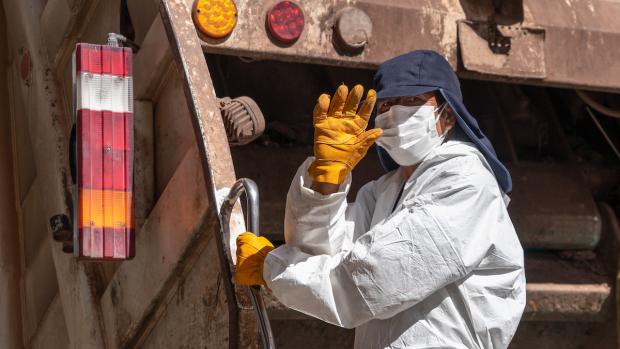The role of sanitation workers in the age of COVID-19
Gabriela Gutierrez Cadavid is using an NYU Undergraduate Urban Humanities Research Fund grant to explore the topic

Like most people, Gabriela Gutierrez Cadavid (’22) did not give a lot of thought to the workers who pulled up the curb each week to empty her trashcans and haul away the contents. That changed last semester, however, when she signed up for a course called “Global Perspectives on Urban Sustainability,” taught by Professor Manohar Patole. “He encouraged us to try to understand our own city’s approach to dealing with waste,” the Sustainable Urban Environments (SUE) major recalls. “In my case, because I’ve been studying remotely from home during the pandemic, that means Monterrey, Mexico, specifically the district of San Pedro Garza García.”
As she discovered when she looked at data from the World Bank, although Monterrey is among the country’s wealthiest cities, its sanitation workers bring home just $3,000 annually — far below the minimum of $12,300 that is needed to live comfortably in a city like Monterrey according to cost-of-living indexes.

Gaby, who chose to study SUE at NYU Tandon because of its dual focus on both the technical and humanistic aspects of the field, began thinking about those unheralded frontline workers. “I tried researching online, and there is nearly no information available about who they are, what they do, how they live, and how they are dealing with the increased risks they face every day as a result of the pandemic,” she says.
She is hoping to remedy that dearth of information with the help of her newly won NYU Undergraduate Urban Humanities Research Fund grant. Chosen on the basis of her compelling research proposal, she is part of the first cohort to garner one of the $1,500 awards, which were launched just this year. “The aim of the project is to provide San Pedro Garza Garcia’s community with a deeper understanding of the sanitation employee experience,” Gaby explains. Currently working on the initial phases of her research project, Gaby plans on conducting interviews with multiple levels of stakeholders in the Monterrey waste management sector: sanitation employees on frontlines, the Municipal Waste Management Agency, and residents of the community. She believes this will provide a comprehensive outlook on waste management through the eyes of all players, something that has yet to be seen in her city.
“I hope that this work will be of interest to the general public as well, because I think it could prompt some much-needed reflection,” Gaby says. “We take sanitation workers for granted, and it is time we recognized their fundamental role in our society, according them the respect they deserve.”
“Gaby is a perfect example of the type of mindset we try to foster within SUE,” says Alice Reznickova, who directs the SUE program. “When many people hear the word ‘sustainable,’ they think only about being green and eco-friendly. But a system cannot be truly sustainable unless it’s also just and equitable. We’re very proud that Gaby is one of the inaugural winners of the new grant and know she will put it to excellent use.”




